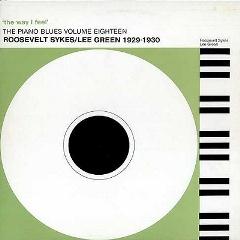The Piano Blues Vol. 18 - Roosevelt Sykes and Lee Green 1929-1930 (1981)
The Piano Blues Vol. 18 - Roosevelt Sykes and Lee Green 1929-1930 (1981)

Roosevelt Sykes 1.- Roosevelt's Blues 2.- Ten And Four Blues 3.- Henry Ford Blues 4.- Poor Boy Blues 5.- All My Money Gone 6.- Home Of Your Own 7.- Lost All I Had 8.- The Way I Feel Lee Green 9.- Railroad Blues 10.- Number 44 Blues 11.- If I Get Drunk 12.- Dud-Low Joe 13.- All My Money Gone 14.- Death Bell Blues 15.- The Way I Feel 16.- Maltese Cat Blues Roosevelt Sykes – vocals, piano (1-8) Oscar Carter – guitar (3,5,8) Harry Johnson – guitar (4,6,7) Lee Green – vocals ,piano (9-16) Unknown guitarist (13,15)
Roosevelt Sykes (January 31, 1906 – July 17, 1983) was an American blues musician, also known as "The Honeydripper". He was a successful and prolific cigar-chomping blues piano player, whose rollicking thundering boogie-woogie was highly influential.
Born in Elmar, Arkansas, Sykes grew up near Helena but at age 15, went on the road playing piano with a barrelhouse style of blues. Like many bluesmen of his time, he travelled around playing to all-male audiences in sawmill, turpentine and levee camps along the Mississippi River, gathering a repertoire of raw, sexually explicit material. His wanderings eventually brought him to St. Louis, Missouri, where he met St. Louis Jimmy Oden.
In 1929 he was spotted by a talent scout and sent to New York to record for Okeh Records. His first release was "'44' Blues" which became a blues standard and his trademark. He quickly began recording for multiple labels under various names including 'Easy Papa Johnson', 'Dobby Bragg' and 'Willie Kelly'. After he and Oden moved to Chicago he found his first period of fame when he signed with Decca Records in 1934. In 1943, he signed with Bluebird Records and recorded with 'The Honeydrippers'.
In Chicago, Sykes began to display an increasing urbanity in his lyric-writing, using an eight-bar blues pop gospel structure instead of the traditional twelve-bar blues. However, despite the growing urbanity of his outlook, he gradually became less competitive in the post-World War II music scene. After his RCA Victor contract expired, he continued to record for smaller labels, such as United, until his opportunities ran out in the mid-1950s.
Roosevelt left Chicago in 1954 for New Orleans as electric blues was taking over the Chicago blues clubs. When he returned to recording in the 1960s it was for labels such as Delmark, Bluesville, Storyville and Folkways that were documenting the quickly passing blues history. He lived out his final years in New Orleans, where he died from a heart attack on July 17, 1983.
Leothus Lee Green, also known as Pork Chops, was an early contemporary of Little Brother Montgomery and a mentor to Roosevelt Sykes. Born in Mississippi around 1900, Green worked as a clothes presser in Vicksburg while perfecting his piano technique. Soon Leothus was traveling throughout the Lower Mississippi River Basin, earning a living by playing piano for the people. Montgomery knew him in Vicksburg, and claimed to have taught him the "44 Blues" in Sondheimer, LA, back in 1922. Sykes first heard Green in 1925 playing his own loosely improvised ragtime, waltz, blues, and jazz accompaniments for silent movies at Miller's Theatre in West Helena, AR. Green taught the then jazz-oriented Sykes how to really play the blues, and the two men became traveling and gigging companions, circulating throughout the region for several years, often simultaneously performing on opposite sides of the same town. Green made his first four recordings in Richmond, IN, for Gennett and Supertone on July 10, 1929, just weeks after Sykes cut his first sides for OKeh in New York. Excepting for a brief excursion to New York in August 1937, Green performed and recorded mainly in or near Chicago. He cut 24 sides for Vocalion in 1929 and 1930, and 14 titles for Decca between August 1934 and September 1937. His last records were made for the Bluebird label in Aurora, IL, on October 11, 1937. Although primarily a bluesman, he was capable of quoting ragtime novelties, shifting into boogie-woogie, and running stride-like jazz passages. Little is known about the life of Leothus Lee Green; his death is believed to have occurred around 1945. --- btstor.cc
download (mp3 @320 kbs):
uploaded yandex 4shared mega mediafire zalivalka cloudmailru oboom uplea








